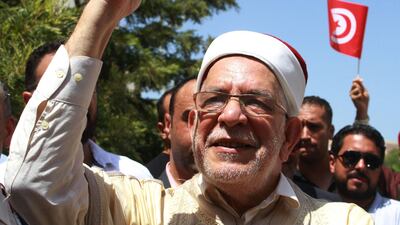Almost 100 candidates will be contesting Tunisia's presidential election next month, including Prime Minister Youssef Chahed who officially entered the race on the last day for filing nominations on Friday.
While the field for the September 15 ballot has broadened to 98, only a few of the more serious contenders appear capable of challenging the support shown for the populist Nabil Karoui, owner of the Nessma TV station, and law professor Kaid Saied in opinion polls.
Tunisia's official election period started on July 16, after which restrictions on polls and interviews with foreign media came into place.
The most significant challenge almost certainly comes from Abdelfattah Mourou, the first presidential candidate to have been put forward by the moderate Islamist Ennahda party. Mr Morou is said to be respected by politicians and public alike. Ennahda leader Rached Ghannouchi is running in the legislative elections slated for October 6.
Prime Minister Youssef Chahed, leader of the secular Tahya Tounes party, also submitted his candidacy on Friday. However, despite his high profile, Mr Chahed is not expected to dominate the race after overseeing years of economic stagnation and a deteriorating currency since his appointment in 2016.
Also in the race is Defence Minister Abdelkarim Zbidi, a technocrat who has typically steered clear of the political squabbling that frequently subsumes the country’s legislature. Mr Zbidi, a medical doctor by training, is backed by the secular Afek Tounes and the ever dwindling Nidaa Tounes, a party that has suffered several splits since it was founded seven years ago by the late president Beji Caid Essebsi as a bulwark against Ennahda.
Also in the running is Moncef Marzouki, the former interim president who served for three years from shortly after the country’s 2011 revolution, and two former prime ministers – the liberal Mehdi Jomaa and Hamadi Jebali, an Islamist.
Ennahda’s foray into the presidential race is unprecedented. The party has previously held back from fielding a candidate over what many suspect are concerns about the divisions that might be created if they held the executive. However, the unusual nature of this year’s contest may have changed past assumptions.
“I think it is largely a reaction to Nabil Karoui's rise in the polls,” said Sharan Grewal from the Brookings Institute. “Mourou is Ennahda's most popular figure nationally, more than Ghannouchi, so has the best chance of beating Karoui.”
Mr Zbidi is touted in the media as the natural successor to Caid Essebsi, whose death at the age of 92 on July 25 precipitated the elections being brought forward from November, but he may also fall victim to a changing political landscape. “Essebsi was able to unite the modernist, secular establishment against Ennahda,” Mr Grewal said. “Today, that's less likely, given that Chahed and others are also running. So I don't see either Zbidi or Chahed performing too well – they will likely divide their base amongst themselves.”
Mr Morou’s candidacy is a direct challenge to Kais Saied’s socially conservative platform. Although well known, Mr Saied does not have the party machinery to galvanise a large share of the vote, which is also the case with Mr Jebali.
“My best guess is that the run-off will pit Mourou versus Nabil Karoui,” Mr Grewal said. “They will represent two very diverse camps: Mourou more Islamist and establishment, Karoui more secular and populist. We can therefore expect quite a bit of polarisation to re-emerge, which will be good for turnout but potentially worrisome if the legitimacy of the elections are also contested,” he said, referring to amendments to the electoral law which would have barred many candidates, including Mr Karoui, from running.
The amended law was passed by parliament but never signed by Caid Essebsi before his death.
Policy details for most candidates appears sketchy, with many falling back upon their party's position or their own track records in office. In part, this reflects the still developing nature of the presidency which, although officially limited to foreign affairs and defence, has been used with varying degrees of success to influence the legislature. However, Tunisia's endemic unemployment, conditions within the country's marginalised interior and wider economic reform are all likely to feature highly in the campaigning.

